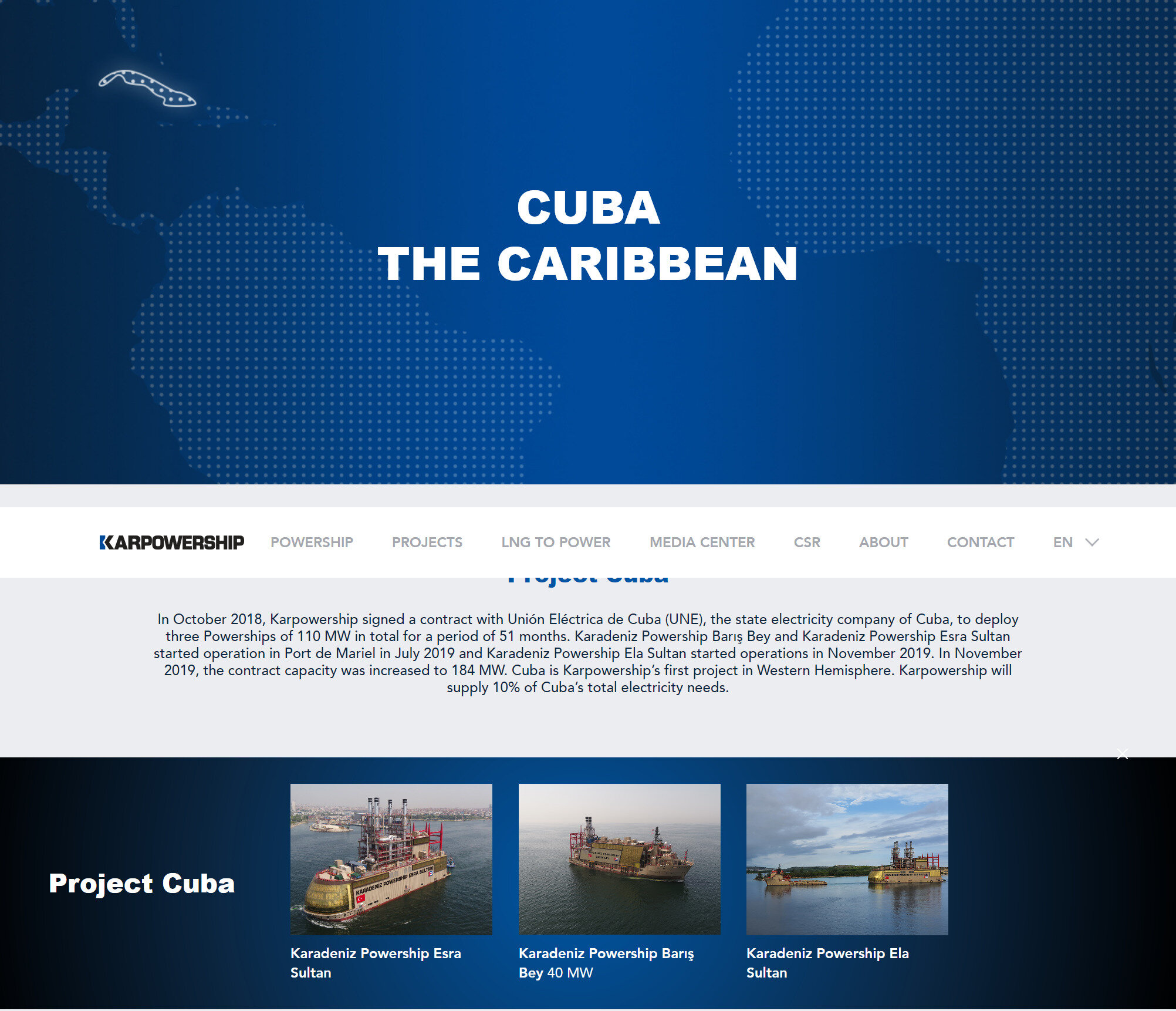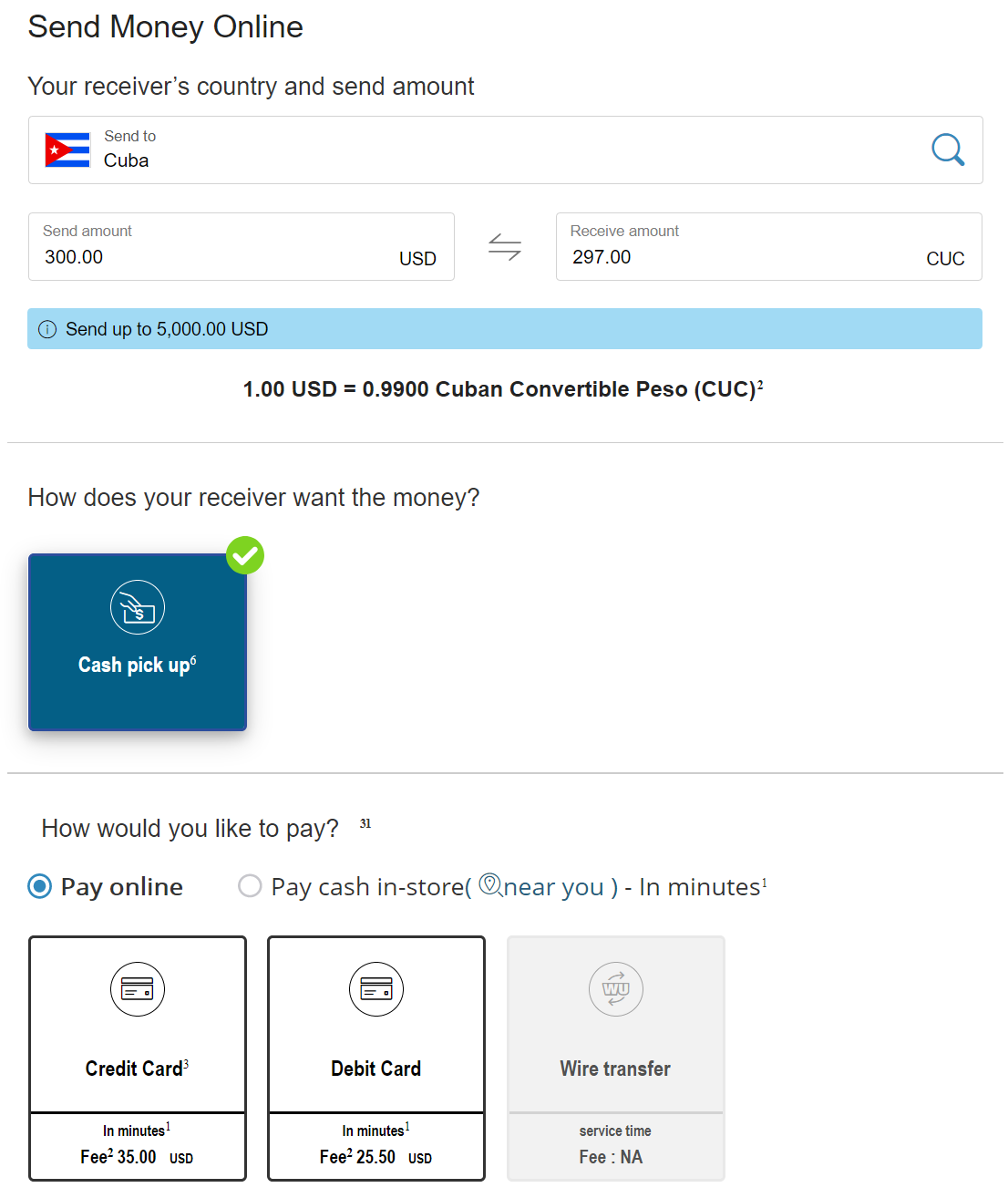Istanbul, Turkey-based Karadeniz Holding and its “Karpowership” project in the Republic of Cuba- Project Cuba: “In October 2018, Karpowership signed a contract with Unión Eléctrica de Cuba (UNE), the state electricity company of Cuba, to deploy three Powerships of 110 MW in total for a period of 51 months. Karadeniz Powership Barış Bey and Karadeniz Powership Esra Sultan started operation in Port de Mariel in July 2019 and Karadeniz Powership Ela Sultan started operations in November 2019. In November 2019, the contract capacity was increased to 184 MW. Cuba is Karpowership’s first project in Western Hemisphere. Karpowership will supply 10% of Cuba’s total electricity needs.”
Argus Media
Cuba in talks to install more Turkish power barges
2 December 2020
By Canute James and Patricia Garip
Turkey's Karpowership is in talks with Cuba to install additional thermal power barges to support three that are now delivering 10% of the island's electricity, the company told Argus. The three floating thermal generating units are berthed in the northern port of Mariel, 40km (24.8mi) west of Havana, and are using heavy fuel oil to supply state-owned utility UNE. The Barış Bey and Esra Sultan barges started operating in Mariel in July 2019, and the Ela Sultan started up in November 2019, expanding contract capacity with UNE up to 184MW. UNE has not responded to a request for comment. Cuba routinely experiences blackouts, partly because of spotty delivery of imported fuel for UNE's oil-fired plants. Some of Cuba's Soviet-era plants burn domestic heavy crude, and others use diesel. Cuba has 5.87GW of installed generating capacity, of which 3.2GW is operational, according to UNE.
Venezuela's state-owned PdV supplies crude and refined products to Cuba under an opaque two-decade-old barter agreement between Havana and Caracas. But PdV's own crude production has plummeted in recent years and its refineries are mostly broken. Cuba still receives some Venezuelan oil aboard PdV-owned tankers that regularly shuttle back and forth to the island despite US sanctions aimed at thwarting the trade. But neither the government nor state-owned oil company Cupet has disclosed the volumes and make-up of the supplies. Venezuela's US-backed political opposition regularly decries the supply to Cuba as a giveaway of the Opec country's resources. It is not clear if the Turkish barges are using Venezuelan fuel oil. The negotiations between UNE and Karpowership are currently paused because of the Covid-19 pandemic but will be resumed "as soon as possible," Karpowership said.
Karadeniz Holding Of Turkey Update On "Karpowership" Operations In Cuba (9 March 2020)
Istanbul, Turkey-based Karadeniz Holding AS has reported: “In October 2018, Karpowership signed a contract with Unión Eléctrica de Cuba (UNE), the state electricity company of Cuba, to deploy three Powerships of 110 MW in total for a period of 51 months. Karadeniz Powership Barış Bey and Karadeniz Powership Esra Sultan started operation in Port de Mariel in July 2019 and Karadeniz Powership Ela Sultan started operations in November 2019. In November 2019, the contract capacity was increased to 184 MW. Cuba is Karpowership’s first project in Western Hemisphere. Karpowership will supply 10% of Cuba’s total electricity needs.”
From Karadeniz Holding: “As of 2019 Karpowership owns and operates world’s largest floating power plant fleet of 25 Powerships with an installed capacity exceeding 4,100 MW. We have a pipeline of 4,400 MW in the works at our shipyards. Karadeniz Holding, which manages the Powership fleet under its international brand Karpowership, produces electricity from Africa to Asia at 15 different locations today. Karpowership covers 10 to 100 percent of electricity production in countries such as Indonesia, Ghana, Mozambique, Gambia, Sierra Leone, Guinea, Guinea Bissau, Senegal and Lebanon. Today, Karadeniz Holding, with operations in 19 countries, continues its investments with 2,600 employees.”
Turkey's Karadeniz Holding Reports Electricity Contract With Cuba In October 2018; But, No Contract Signed Five Months Later (1 April 2020)
The February 2019 issue of The Turkish Perspective, distributed to passengers traveling on Istanbul, Turkey-based Turkish Airlines, included an article on page 20 about Istanbul, Turkey-based Karadeniz Holding and its “Karpowership” project in the Republic of Cuba. The title of the article was “The Floating Energy Hub Of The ‘One World’” Karadeniz Holding is taking Turkey’s technology to other countries with it’s global brand Karpowership. As of 2018, it has become the company with the world’s largest floating power plant fleet with 15 energy ships with an installed capacity of 2,800 MW.”
“Lastly, in October 2018, Karpowership expanded to South America and signed a contract with Energoimport, part of the Ministry of Energy of Cuba [Republic of Cuba government-operated Union Electrica], to provide electricity of 160 MW for 51-months. This is a crucial step in the Power of Friendship project, as Karpowership continues to spread ability to access economical electricity around the world.”
Unknowns: Is Energoimport paying the full cost of the service? Why is the service contract for 51-months? Why is the service contract for 160 MW? Where will the vessel be docked in the Republic of Cuba?
Response from Karadeniz Holding: “The details of our project are not fixed, still in the works, we will reach back out to you once our full project parameters are finalized.” Karadeniz Holding had sought an employee to manage its operations in the Republic of Cuba.
From the company’s Internet site: “Since 2010, 15 Powerships have been completed reaching 2,800 MW installed capacity. In addition, 18 Powerships with a total capacity of 5,000 MW will be added to the Karpowership fleet. Powerships have been supplying 25% of Lebanon, 23% of Ghana, 10% of Mozambique, 30% of Northern Sulawesi, Indonesia, 55% of East Nusa Tenggra, Indonesia, 80% of Ambon, Indonesia, 10% of Sudan, 33% of Gambia, and 33% of Sierra Leone’s total electricity generation. By 2018, it has met 15% of Iraq’s and 16% of Zambia’s energy needs.”
PROJECT MANAGER, CUBA- Karadeniz Holding
“Founded in 1948, Karadeniz Holding engages in various sectors, primarily energy, finance, tourism and real estate industries. The Group is the only owner, operator and builder of the first Powership™ (floating power plant) fleet in the world and plays an active role in medium to long-term investments with more than 1600 employees around the world in different 16 countries in Europe, Africa, Asia and Latin America.
We are looking for PROJECT MANAGER (Turkish citizen and/or expat) who will be working mainly for our Power Plant projects in Cuba. The candidate shall be based in the Head Quarter in Istanbul and responsible of the administrative and commercial part of Powership projects implementation. The successful candidate should have the following qualifications; Engineering degree, MBA or masters degree is a plus, At least 7 years experience required, preferably in international Project Management, Experience in Latin America electricity market and power generation sector in a project management capacity ideal, Preferably experienced in commercial management of international investment projects in the energy sector, Thorough knowledge of Project operations and financial processes, Native-level Spanish with excellent written and spoken is must, ideally with an additional language, preferably Portuguese, Very good command of MS Office Applications, High level of presentation skills, Financial understanding and business mindset, An outstanding eye for detail with a drive to provide exceptional administrative support, Ability to perform in a complex cross-functional business environment, Ability to work well as part of a strategic team in a fast-paced, deadline-oriented work environment, completing multiple complex tasks simultaneously, Excellent communication, negotiation & conflict management skills, Outstanding influencing, interpersonal and networking skills to drive collaborative culture at all level, Strong critical thinking and effective problem solving skills, Keen and effective team player, No restrictions for travelling inside of Turkey and across Africa and LatAm, No military obligation for male candidates.
JOB DESCRIPTION- Typical responsibilities to include; Manage proactively all contractual matters related to the project, follow performance criteria within the scope of the contract and defend the company against any contractual breaches and preserve interests, Supervise the timely production, submission and reception of documents/reports and make sure appropriate follow-up is made by concerned parties, Contribution to the evaluation process (cost, schedule, technical content, etc.) of identified development ideas during the Business Plan preparation, Responsible for coordination and follow up of project realization (control and supervision of project preparation and implementation incl. follow-up activities) during the entire lifecycle of the projects, Responsible for consulting/preparation of sales invoicing studies, Submission of periodical progress reports.
The Foundations of Karadeniz Holding were laid in 1948 by Rauf Osman Karadeniz. Karadeniz Holding began in the machine and heavy industry trade and diversified its business interests over the years. In 1996, Karadeniz Holding Group saw the growth potential in the energy industry and decided to take step into that industry by founding the Karadeniz Energy Group. Karadeniz Energy Group became the first company to obtain more than one license throughout the energy value chain in Turkey ın 2002, with the liberalization of the Turkish Energy Industry. The production, wholesale and export licenses were obtained. Karadeniz Holding Group decided to diversify its business concerns, acquiring Pamuk Factoring, Pamuk Leasing, and Eti Yatırım, opening operations in the finance industryın 2007. The group plays an active role in all finance operations except banking In 2009, the Karadeniz Energy Group began designing and producing "Powership" in order to establish world's first floating energy ship fleet in keeping with its vision of global expansion. 5 ships sailed to Iraq and Pakistan and commenced energy production in 2010 – 2011. Continuing its activities in the energy, finance, tourism and real estate industries with 1.500 employees, Karadeniz Holding promotes Turkey and continues to contribute value added to the national economy with business activities and international investments for over 60 years.
The Foundations of the Black Sea. Black Sea Business In 1996, Karadeniz Holding Group saw the growth potential of the Black Sea Energy Group. Black Sea Energy Group has become one of the top companies in the world in 2002, with the liberalization of the Turkish Energy Industry. The production, wholesale and export licenses were obtained. Karadeniz Holding Group decided to diversify its business concerns, acquiring Pamuk Factoring, Cotton Leasing, and Eti Investment, opening operations in the finance industry in 2007. The group plays an active role in all finance operations except banking In 2009, the Karadeniz Energy Group began designing and producing "Powership" in order to establish the world's first floating energy ship fleet in keeping with its vision of global expansion. 5 companies sailed in Iraq and Pakistan in 2011 - 2011 activities for over 60 years.”
Karpowership Brochure In PDF Format
Karadeniz Of Turkey Delivering Floating Power Plant To Cuba For 51-Month Contract (23 April 2020)
From The Republic of Cuba: Ankara, Apr 10 (Prensa Latina) The agreement between Cuba and the Turkish company Karadeniz Holding put a floating power plant on the way to the port of Mariel, diplomatic sources informed Prensa Latina this Wednesday. In the ceremony of departure of the ship, named Karadeniz Baris Bey, were present the technical director of the Electrical Union of Cuba (UNE), Lázaro Guerra; and the ambassador of Cuba in the country, Luis Amorós Núñez; and the president and vice-president of the owner company, Osman and Orhan Karadeniz. In this way, Cuba becomes part of the group of 9 countries that have floating facilities for the production of electricity, built by the Turkish group, and will be the first in Latin America to be able to participate in this innovative experience. The ship departed from the port of Yalova, in the sea of Marmara, in western Turkey, where it was built in the Karmarine shipyards, and upon its arrival on the island the power plant will be connected to the grid to supply the National Electric System of Cuba for a period of 4 years.
From The EEOC On 31 March 2019: The February 2019 issue of The Turkish Perspective, distributed to passengers traveling on Istanbul, Turkey-based Turkish Airlines, included an article on page 20 about Istanbul, Turkey-based Karadeniz Holding and its “Karpowership” project in the Republic of Cuba. The title of the article was “The Floating Energy Hub Of The ‘One World’” Karadeniz Holding is taking Turkey’s technology to other countries with it’s global brand Karpowership. As of 2018, it has become the company with the world’s largest floating power plant fleet with 15 energy ships with an installed capacity of 2,800 MW.”
“Lastly, in October 2018, Karpowership expanded to South America and signed a contract with Energoimport, part of the Ministry of Energy of Cuba [Republic of Cuba government-operated Union Electrica], to provide electricity of 160 MW for 51-months. This is a crucial step in the Power of Friendship project, as Karpowership continues to spread ability to access economical electricity around the world.”
Unknowns: Is Energoimport paying the full cost of the service? Why is the service contract for 51-months? Why is the service contract for 160 MW? Where will the vessel be docked in the Republic of Cuba? Response from Karadeniz Holding: “The details of our project are not fixed, still in the works, we will reach back out to you once our full project parameters are finalized.” Karadeniz Holding had sought an employee to manage its operations in the Republic of Cuba.






































